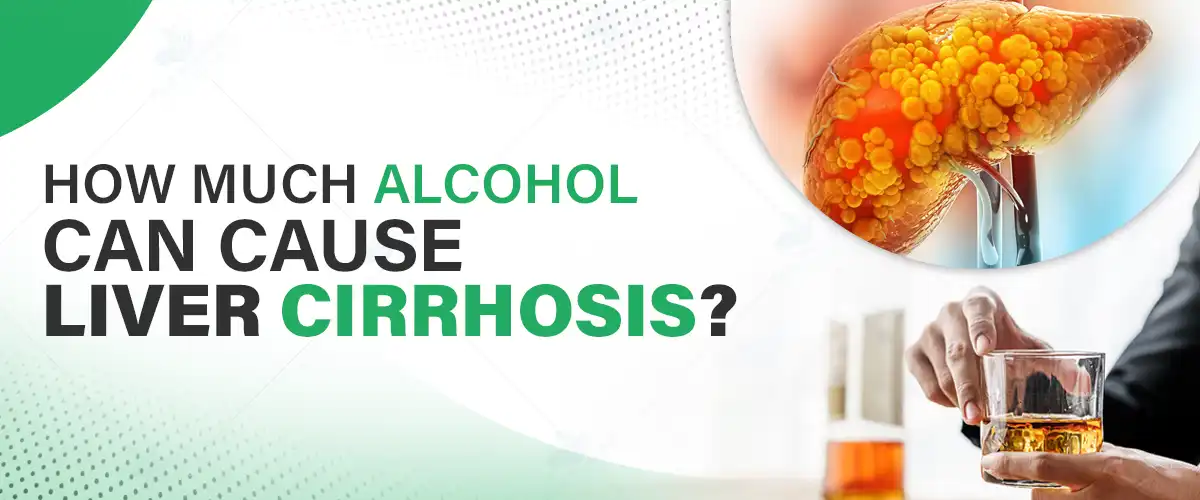
Subscribe to our

Liver cirrhosis is a serious and progressive condition that severely impacts liver function and overall health. It occurs due to long-term damage and scarring of the liver, often resulting from excessive alcohol consumption. Understanding how much alcohol can cause liver cirrhosis? its effects and preventive measures is crucial in maintaining liver health.
Alcohol is a leading cause of liver damage, often requiring medical intervention at a gastroenterology emergency hospital. This article explores the relationship between alcohol and liver health, safe drinking limits, and the best treatment options available.
Early diagnosis and intervention can prevent severe complications. Book your appointment today by Calling +91 9667064100.
Liver cirrhosis is a late-stage liver disease characterized by fibrosis (scarring) that replaces healthy liver tissue, leading to liver dysfunction. The damage is often irreversible and can progress to liver failure if left untreated.
How the Liver Processes Alcohol
The liver metabolizes alcohol primarily through enzymes that break it down into less harmful substances. However, excessive alcohol intake overwhelms this process, leading to inflammation and scarring over time.
Stages of Liver Damage Due to Alcohol
1. Fatty Liver Disease (Steatosis) – Excessive fat accumulates in the liver, often without symptoms.
2. Alcoholic Hepatitis – Inflammation of the liver occurs, causing pain, jaundice, and nausea.
3. Cirrhosis – Severe scarring replaces healthy liver cells, leading to liver dysfunction and complications.
General Guidelines on Alcohol Consumption
Excessive alcohol consumption is a primary cause of liver cirrhosis. But how much alcohol can cause liver cirrhosis? The risk depends on the amount and duration of alcohol intake.
Safe Drinking Limits for Men and Women
Risk Factors That Influence Alcohol-Related Liver Damage
Several factors can make an individual more susceptible to alcohol-induced liver damage:
Early Signs
Advanced Symptoms
When to Seek Medical Help
If you experience persistent fatigue, unexplained weight loss, or jaundice, consult with the hospital immediately.
Common Diagnostic Tests
Treatment Options
Effects of Quitting Alcohol
Once cirrhosis develops, the damage is largely irreversible, but alcohol-induced liver damage can be managed by quitting alcohol.
Role of Diet and Medications
Long-Term Outlook for Patients
With early intervention and lifestyle modifications, patients with early-stage cirrhosis can maintain a good quality of life.
Reducing Alcohol Consumption
Limiting alcohol intake significantly reduces the risk of alcohol and liver cirrhosis.
Healthy Diet for Liver Function
Healthy foods, such as leafy greens, nuts, and antioxidant-rich fruits, helps protect the liver.
Importance of Regular Liver Check-Ups
Routine liver function tests help detect early signs of liver damage, allowing for timely intervention.
If you are experiencing early symptoms of fatty liver disease or cirrhosis, seeking expert medical advice is crucial for timely diagnosis and effective treatment. At Felix Hospital, we take pride in our team of highly experienced gastroenterologists committed to delivering comprehensive and specialized liver care.
Our renowned specialists, Dr. Jagatjot Singh Gill and Dr. Amrit Yog Datley, are among the leading gastroenterologists in the field, offering advanced diagnostics, personalized treatment plans, and cutting-edge medical interventions for liver diseases. Whether you require detailed imaging, lifestyle guidance, or specialized therapeutic care, our experts ensure the highest standards of patient care with a compassionate and expert-driven approach.
Protect your liver health—schedule a consultation with our specialists at Felix Hospital today!
Excessive alcohol consumption is a major cause of liver cirrhosis, and understanding how alcohol causes cirrhosis is essential for prevention. By maintaining healthy drinking habits, following a nutritious diet, and seeking regular liver check-ups, individuals can protect their liver health.
If you are experiencing symptoms of alcohol-induced liver damage, do not hesitate to seek medical guidance. Felix Hospital’s expert gastroenterologists are here to provide world-class care and support for your liver health journey.
1. Can occasional binge drinking cause liver cirrhosis even if I don’t drink daily?
Ans: Yes. While daily drinking is a major risk factor, binge drinking (consuming large amounts in a short period) can also lead to liver inflammation and accelerate damage over time.
2. Does switching from hard liquor to beer or wine reduce the risk of cirrhosis?
Ans: No. Liver damage depends on the total amount of alcohol consumed, not the type of alcohol. Beer, wine, and spirits can all contribute to cirrhosis if consumed in excess.
3. Is liver damage from alcohol reversible if I stop drinking?
Ans: In the early stages (fatty liver or mild hepatitis), the liver can repair itself. However, once cirrhosis develops, the scarring is permanent, but stopping alcohol can prevent further damage.
4. Are there specific symptoms that indicate alcohol-related cirrhosis versus other liver diseases?
Ans: Symptoms like hand tremors, frequent bruising, spider-like blood vessels on the skin, and confusion (hepatic encephalopathy) are more common in alcohol-induced cirrhosis.
5. Can people with cirrhosis ever drink alcohol again in moderation?
Ans: No. Even small amounts of alcohol can worsen liver damage in cirrhosis patients. Complete abstinence is the only safe option.
6. How does alcohol-related liver disease differ in men and women?
Ans: Women have lower levels of alcohol-metabolizing enzymes, making them more susceptible to liver damage even at lower alcohol consumption levels compared to men.
7. What are the early warning signs of alcohol-induced liver damage before cirrhosis develops?
Ans: Frequent nausea, dull pain in the upper right abdomen, unexplained weight loss, persistent fatigue, and dark urine are signs that your liver may be under stress from alcohol.